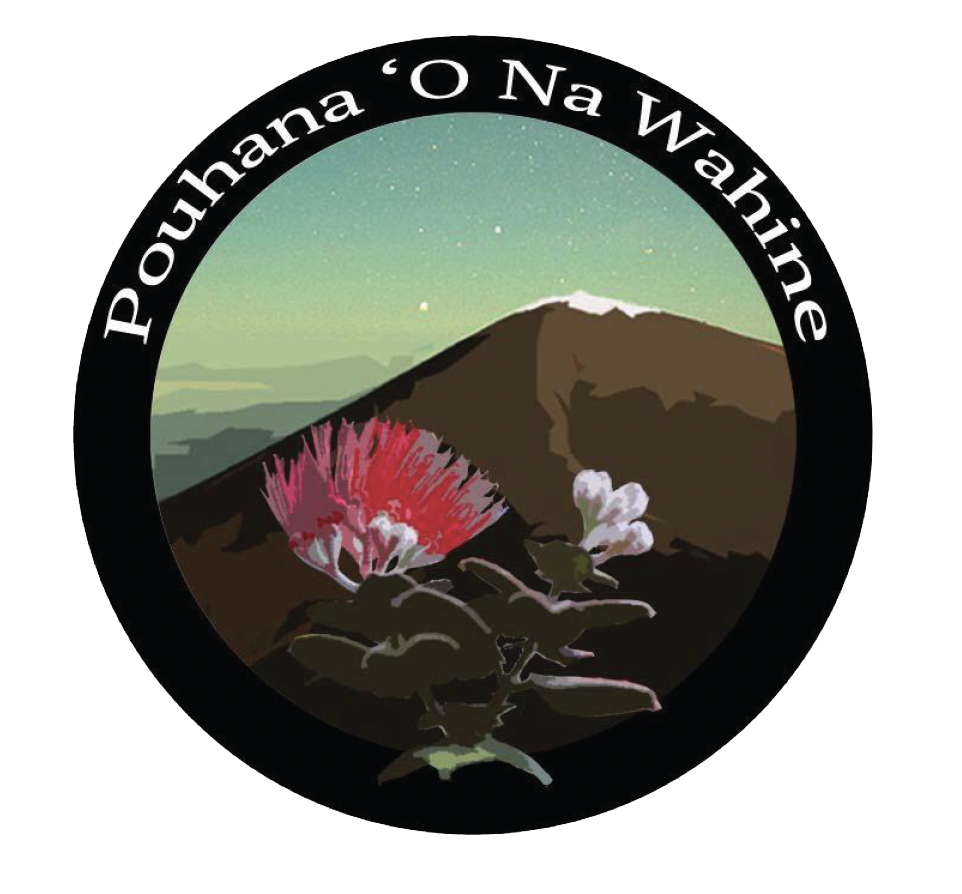
Mana Wahine (Powerful Women)
Calling for Change, Creating A Native Hawaiian Resource Center on Domestic Violence
Here, advocates speak to the significance and importance of the establishment of a Native Hawaiian Resource Center on Domestic Violence in creating space for Native Hawaiians to heal and change, individually and collectively.
Paula Julian
Marlin Mousseau is a Lakota man, a recovering batterer, a tiblo (older brother), and longtime advocate. One of the lessons I’ve learned from Marlin is the importance of identifying the point in the specific histories of Native people when your culture began to shift away from respect for women to violence against women. The U.S. overthrow of Queen Liliʻuokalani was such a shift for Native Hawaiians that is reflected in the systemic barriers, violence, and disparities that Native Hawaiians experienced. Marlin says if you know this starting point, then you can end it. We are the sisters, aunties, and relatives that are here to share aloha and support women, and help others learn to do the same. A Native Hawaiian Resource Center on Domestic Violence will create a space as a family for survivors and help others learn how to be family and best support survivors. The Pouhana ‘O Nā Wahine is changing the trajectory for themselves, their children, and their grandchildren. Thank you, sisters, for your faith, commitment, and efforts to make these changes. In the silence and darkness of the genocide and violence Native Hawaiian women have experienced, you sisters have been the brightest light and most beautiful voice.
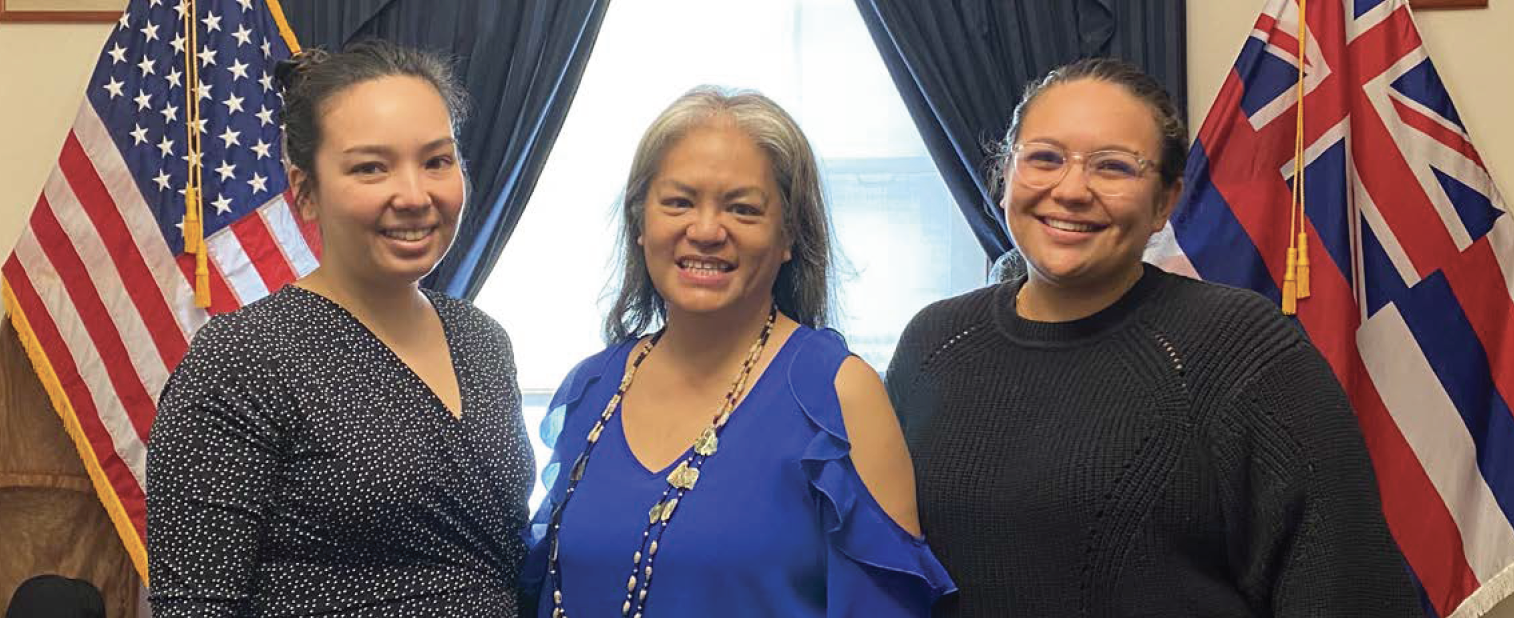
Aunty NaniFay Paglinawan
I was born on the Big Island, raised on Oahu, and lived on Maui. Those different environments made me––the different mountains, valleys, and oceans. My husband was a fisherman, and we camped a lot with my children on pohaku (rocks). We didn't do sandy beaches and all those nice tourist stuff. My mother ran her own restaurant and luaus and served Native foods. I was raised picking limu (seaweed) and different parts of the ocean grow different limu––freshwater, saltwater, and Muliwai, which is where the saltwater and the freshwater meet, which is my favorite and one of the best limus.
My story is a very common one for Native Hawaiians because of the trauma of colonization, and the effects of this trauma, the alcohol, the abuse, the drugs, and addiction. We need to acknowledge this trauma so that we can heal. When I acknowledge where I come from, I'm healing, and when I heal myself then I help to heal my mother, my mother's mother, my mother's mother's mother.
I did my genealogy around women's issues and domestic violence, and I can go way back on both my mother’s and father's sides, including the White British part of me. Plenty British married Hawaiians for land, and my family isn't any different. I learned about the British practice of the lords that overlooked the lands who had sex with girls before they married when they got their first period. That's rape that unfortunately continued up until my parents’ generation, which is very hard to talk about. Very painful, and most definitely impacted my generation.
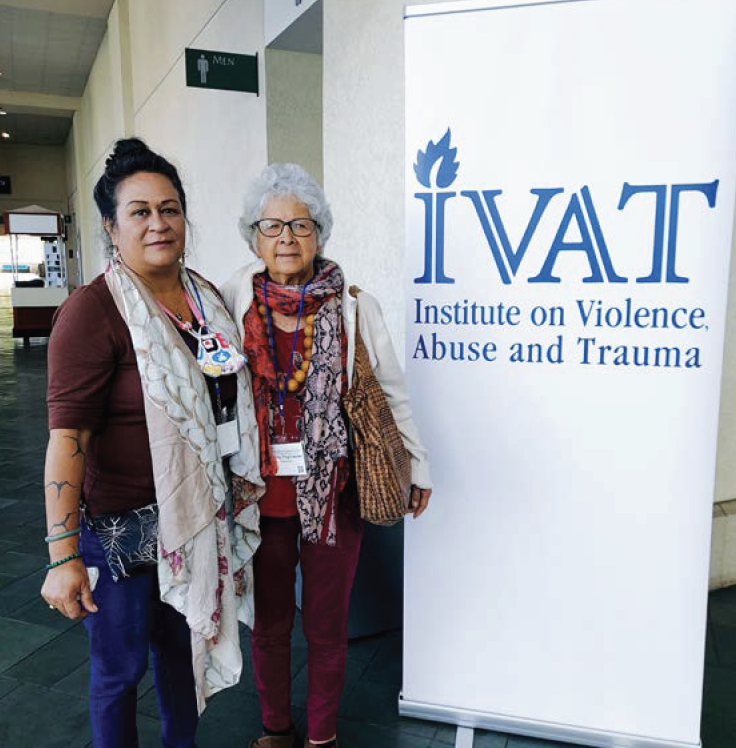
Because of my work as an advocate and personal work and choices for myself, I’ve been able to make changes in my life for my children and mo‘opuna (grandchildren). It cannot be somebody else that's going to change it or break it. I must break it. I must ask myself what do I do and figure out how to do it? I don't want to abuse in my household. I don't want to hit my children. I did it different. My daughter is definitely different from me, a good different. She can talk and have a conversation with her children and laugh and hug. The generational trauma is breaking, it's changing for my mo‘opuna.
I've been in this movement since my daughter was born and she is now 43 years old. For 43 years, I've been actively involved in different ways. I'm a different human being than I was 50 years ago and to have Congress acknowledge the need for a Native Hawaiian Resource Center on Domestic Violence (NHRCDV) means a lot to me.
On a global basis, we're all starting to stand up and the energy around the globe is connecting. We each have a responsibility. Helping us help each other and the world. It just cannot be any other way.
When I acknowledge where I come from, I’m healing, and when I heal myself then I help to heal my mother, my mother’s mother, my mother’s mother’s mother.
—Aunty NaniFey Paglinawan, Pouhana ‘O Nā Wahine
As an advocate and a survivor, too often women especially in prison have been so impacted by their victimization, hesitating to take care of themselves because they’ve learned that they need someone else’s permission. The process of healing and changing sometimes involves me giving women permission with aloha to take care of themselves. The NHRCDV will create a space for us as Native Hawaiians to heal and change, individually and collectively. The NHRCDV can be like the blowing of the pu (conch shell) used for pule kahoahoa (appeals) that is raised toward the heavens from east to west and north to south for change. The NHRCDV can be the medium for all to heal. We have Hawaiian organizations helping in different ways, but they don’t collaborate enough. The NHRCDV can be a means of collaboration whether you're working with youths, adults, elderly, babies, foster care, or trafficking.
We are four different people. We need different, we don't want all the same. Different can be powerful. We have the same intention. We're going to approach it in four different ways and that's positive. I do not take that as a negative.
Rosemond “Loke” Pettigrew
Our aina (land) is our foundation, our life, and protection. The taking and mistreatment of our aina have resulted in anger, substance abuse, violence, and the disparities Native Hawaiians experience due to the loss of connection with our identity as keiki o ka aina (children of this land). As a domestic violence advocate and Native Hawaiian community member, I understand, have witnessed, and experienced the impact on our people from contact with foreigners like Captain Cook in 1778, to the overthrow of our government in 1893, to today 2022.
I don’t recall, in my 14 years of working at the domestic violence shelter on Molokai or in my 26 years working for the Hawaii State Judiciary and participating in statewide conferences, the history of violence and atrocities committed against Native Hawaiians was ever presented. I would estimate that within the last six years a shift occurred and local domestic violence and other programs, working with Native people, started to incorporate Native Hawaiian cultural practices into their agencies as a tool for healing from the violence. However, there was no program content addressing the specific needs of Native peoples and the hardships we have faced due, in large part, to the colonizers. The impact of colonization on Native Hawaiian communities was not even on anyone’s radar, in my opinion. Iʻm not saying the information and content of the conferences werenʻt relevant to the work that we do. It is relevant.
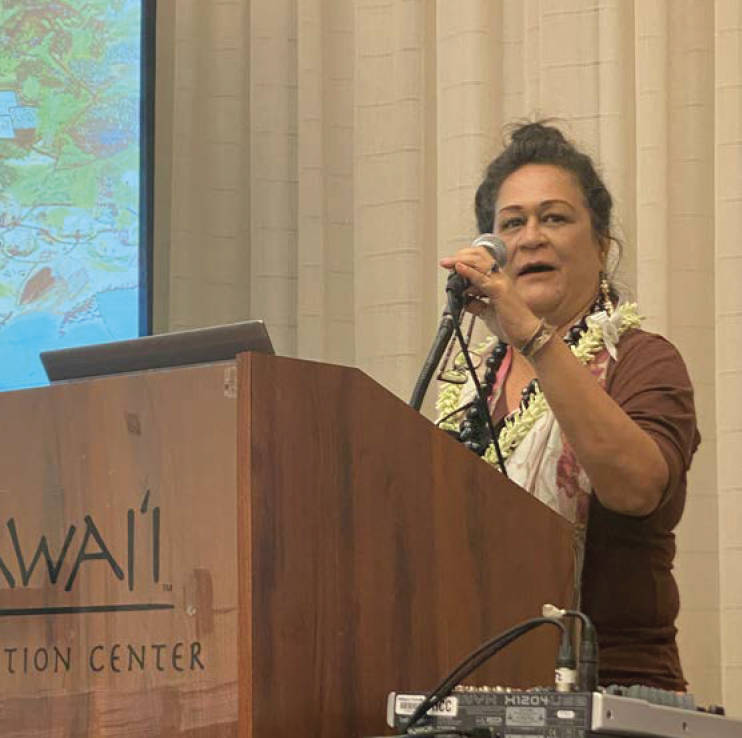
A Native Hawaiian Resource Center on Domestic Violence will uniquely address the issues that we as Native Hawaiians continue to experience.
I have also seen that little seems to have changed today for women victimized by domestic violence from the 1980s. Women often don’t call law enforcement for help for so many reasons, including shame, guilt, worry about where she and her children are going to live, not having money, ill-treatment by law enforcement, and fear of their children being taken away by child protective services, the list goes on. I also understand that it’s not unusual for women to feel like they may have greater support from close friends or family than from agencies and programs because of trust issues, comfort zone, or judgment in shelter settings. So, our work to support the capacity of our families, friends, and communities must be central for us as a resource center.
Native Hawaiian communities have different needs based on many factors. Some live on Hawaiian Home Lands (homesteads) while others live in urban or rural areas of Hawaii or out of state. Housing needs of Native Hawaiians continue to plague our people as the cost of housing in Hawaii has skyrocketed and the need for housing has increased. A 2017 report issued by the U.S. Department of Housing and Urban Development found that “Nearly half of Native Hawaiian households experience a problem of affordability, overcrowding, and structural inadequacy.” Regardless of where our kanaka (people) live, many continue to experience health, educational, economic, and social disparities as recognized by Congress in the 1993 Apology to Native Hawaiians.1
There’s a lot of work to do to heal from the violence and trauma and to prevent further violence in Native Hawaiian communities. Our people have survived in the face of adversity, and we continue to thrive and rise above the injustices by defending our sacred spaces, restoring ancient fishponds, cultivating kalo (taro), honoring our rich cultural heritage, and exercising our right to be Hawaiian on the aina (land) of our kupuna (ancestors). The pride of our people is reflected in the Second Hawaiian Renaissance of the 1970s.
An NHRCDV can focus on addressing domestic violence and sexual violence from a Native Hawaiian perspective, including educating on the history of this violence, and the ways in which our identities as Indigenous peoples have been attacked. This education can strengthen the societal response and capacity to increase the safety of our families. A resource center with dedicated staff can promote community awareness and outreach campaigns and provide important visibility for Native Hawaiians, especially for survivors to know that they have a place designed and managed by and for Native Hawaiians as our primary purpose. The Pouhana ‘O Nā Wahineʻs efforts would strengthen mainstream agencies, organizations, and the state that serves all people but specifically increase their capacity to address the violence against Native Hawaiians.
Since 2015 we have worked tirelessly to get to where we are today. We have manifested what change we want to see with our hearts, mind, time, and effort and our federal policymakers responded recently with an appropriation for the NHRCDV. It is the Pouhana ‘O Nā Wahineʻs intention to open and operate the NHRCDV. It is a monumental time for us as advocates and this is the first federally funded program in Hawaii to address the disparities of violence against Native Hawaiian women. It has taken 244 years from 1778 for this shift to occur to restore the respect of women and our people. This shift is due, in large part, to our organizing work as the Pouhana ‘O Nā Wahine with Congressional champions in Washington, D.C., and our sister organizations the NIWRC, the Alaska Native Women’s Resource Center (AKNWRC), the National Congress of American Indians (NCAI), StrongHearts Native Helpline, the Alliance of Tribal Coalitions To End Violence, the Indian Law Resource Center, and our many other partners at the state and national levels.
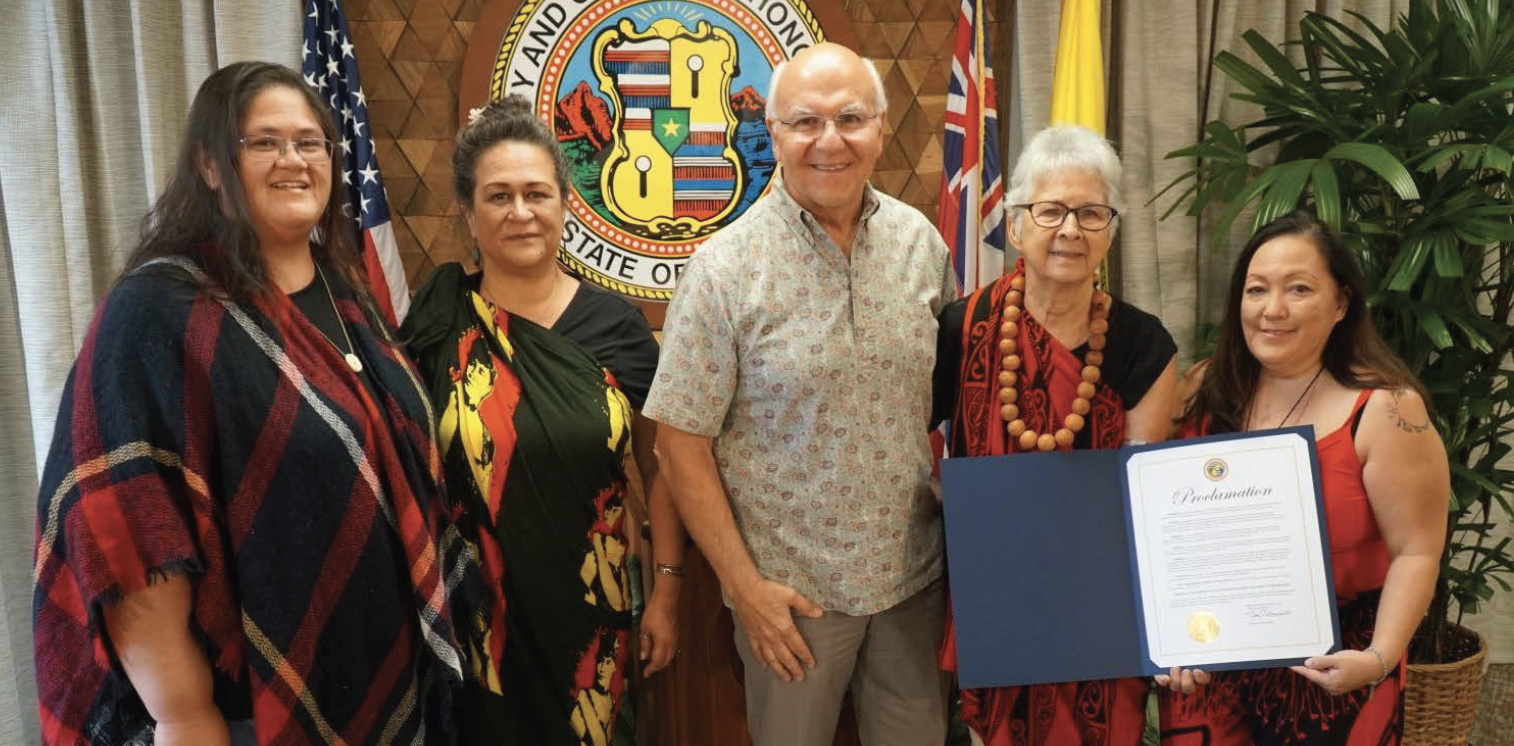
Dayna Schultz
Speaking at the recent Institute on Violence, Abuse, and Trauma (IVAT) conference in Hawaii was a big reminder of the work, our reasons, mission, and passion. I speak as a survivor, more so in the last year than I have throughout my career. This is my truth. He was in the 25th Infantry of the Army. With my Dad and Grandpa being veterans of the 25th Infantry—so it’s not all negative, as there’s some pride in that command—but I never talked about my story with my family, friends, or publicly.
Sharing my experience, it’s important for others to know because my story may be like your story. I had no support system far from home. I was not going to tell people what was going on at my house. I told myself to bear the pain. I felt very lost. The depression set in, and it was so heavy. I was stuck and there was nothing healing about my environment. Everything that I was internally, wasn’t supported externally, which further compounded the pain and increased the silencing of my trauma.
Fast forward 22 years, I felt that I had a lot of spiritual support that day at the IVAT conference. I am stronger and have a good support network, including but not limited to, healers and fellow survivors in the community, which helps to balance my mana (spiritual energy).
I started doing the work as a survivor so I could heal. That was my way of healing because no one in my family talked about it. It was like, get over it, move on with your life, and it wasn’t until the advocates who supported me told me you cannot put a timeline on your healing from that kind of victimization. I am grateful for the sister advocates who supported me in my most vulnerable time.
Telling my story at IVAT reminded me of the importance of having something for Native Hawaiian people and being recognized as a nation, as a people separate from others. As Native Hawaiians, we have a distinct history and culture.
“There’s nothing like having someone from your own culture to sit with you, cry with you, hug you, and hold you during your most vulnerable time, so that’s what it means to me.”
––Dayna Schultz, Pouhana ‘O Nā Wahine
It’s important for us to have funding for an NHRCDV because, for survivors like me that were on the continent (stateside) and didn’t have any connection to home or culturally specific resources at that moment, an NHRCDV can help provide that. We’ll have legs and arms that can make that possible to help survivors in their most vulnerable, darkest times. They connect with someone that understands where they’re from and what their values are. The importance of not necessarily locking up their abuser but healing the family and having that regard and not saying let me fix you but giving them space to let them sit in it if that’s what they need to do. Let them be, hold them in that space, and have that aloha resonate from our islands to all over the continent. There’s nothing like having someone from your own culture to sit with you, cry with you, hug you, and hold you, so that’s what it means to me.
The NHRCDV can provide education to the military since my domestic violence occurred on a military base and educate them because they revictimized me. Instead of taking care of me, they told me I had five days to get out of the house since the house is for the soldier, despite the domestic violence and his infidelities, alcoholism, and multiple traumas. Education for the military is vital, along with breaking that cycle of revictimizing the victim for seeking help and being preyed upon by other military members.
Also, it’s important that younger people, high schoolers, and middle schoolers are aware that domestic violence is not healthy and normal. The NHRCDV can bring this awareness to light and help ensure the never-ending flow of our Native Hawaiian worldview of being pono (in balance) from our keikis (children) to kupuna (elderly). People will hear our voices, our messages, and continue to carry it through to others—forever flowing.
I also want to build relationships with agencies that are driven to help Native Hawaiians, so our resource center will be successful because at the end of the day we’re helping our people. In Aunty NaniFay’s honor, and for many other survivors like me, we’re going to be on the map, and indisputable. While I watched President Biden’s VAWA Commemoration event this past March, I projected into the universe that for the next reauthorization of the Violence Against Women Act, Native Hawaiians are going to be there and be meaningfully recognized. It’s totally on, I got more years left in my lifetime. I’m up for the challenge.
Dolly Tatofi
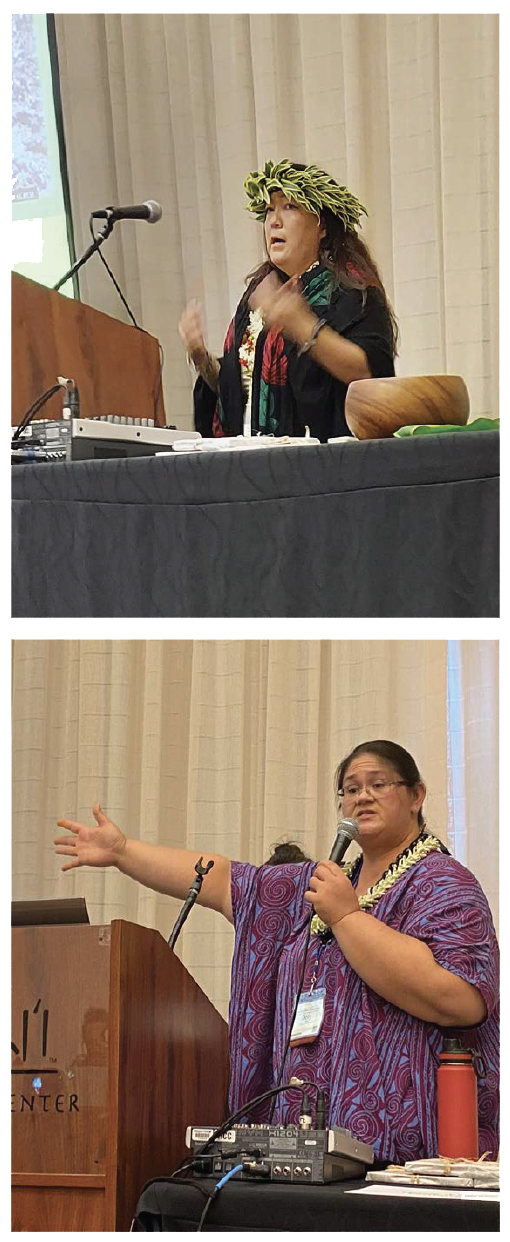
Today we live in a po’o (head) heavy society. We overuse our brain/mind muscles and forget to use our other muscles such as our pu’uwai (heart) and na’au muscles. Because of this disproportionate use of our muscles, we add to the disconnect that was caused by colonizers. We also cannot forget that our kino (body) is a muscle that needs attention because this helps us capture what we know to be true, and it presents physically and visually. We subconsciously carry the disconnect with our own beings, making it difficult to connect with others. We need to ask ourselves—do I really want to carry that disconnect that was passed on to me? Something does not feel right. Sometimes we need situations to remind us of these disconnects so that we can utilize the other parts of our being to maintain lasting, loving relationships. In my eyes, although we were physically disrupted when our lands were abused and taken from us, which led to mental disruption and emotional unrest, we still have a spiritual being that knows and feels others and can maintain a connection no matter the circumstance.
Uncle Ishmael (Stagner) wrote a book Na Hulu Kupuna O Hula and talked about P.I.N.K. (Puʻuwai, ʻIke, Naʻau, and Kino). Sometimes, I ask and put it out there, what are you pinking today? Instead of what you think? It’s a great tool for understanding where you are at any moment. How is your Puʻuwai (heart), your ʻIke (head), your Naʻau (intuition/gut), and your Kino (body)? How are those all aligned or not? We must be in a state of alignment to be fully present.
I’m deeply grateful for the essence of Queen Liliʻuokalani to support us to stand strong in this present not just sadness for that time and all that she took on. She had to be strong and think through how she was going to create peace for all. Some people think Liliʻuokalani made her choices to save just our people. I believe she did it for everybody, even for the people that held guns against her. I don’t feel that it was just for our people. She had a caring spirit for everyone no matter who they were. You can find this essence in the songs she wrote. She loved, honored, and respected everyone. What she did was very powerful and amazing in the quietest and most peaceful way. This is what I see as aloha with grace.
Reflecting on Liliʻuokalani…I honestly did not know that back in 2015 with our first meeting with NIWRC that this would be part of my journey. Supporting and advocating for women and families in the domestic violence field was not my forte. I’m not immersed in it. It’s not my focus. I have not knowingly been exposed to the pain and suffering of abuse that my Pouhana sisters have endured. I am very grateful to be here, and I feel that this is why Liliʻuokalani has been ever so present in these moments. We are in a position like that now and need to help everybody open their hearts to organize and increase Native Hawaiian women’s safety. And the way to do this is with complete Aloha. This is paramount. (See Aloha Spirit Law on opposite page.)
For the Pouhana ‘O Nā Wahine’s recent IVAT presentation we talked about the imposition of another culture upon our people that resulted in depression and aggression for us. During our presentation, you could feel all the emotion and anger build up in us and the participants. In the middle of our presentation, we needed everybody to breathe because we didn’t want to be stuck in that emotion. We had an ʻumeke (sacred bowl) in the room to direct all that energy through Hanu (inhale) and Hā (exhale). I was able to release this wai (water) back into the kai (ocean) to be transformed into aloha with the help of kūpuna (ancestors) and nā Akua a me nā ʻaumakua (the gods and family spirits) of that wahi (space). We’re not going to stay there in all that pain and suffering. We want to be in aloha always and in all ways. That was an example that those emotions are still trapped within us and our people. We need healing for unresolved and residual trauma through regular practices of hoʻoponopono (Hawaiian conflict resolution) and other healing modalities.
With the essence of Liliʻuokalani making her presence more and more apparent, now is a time to huliau and turn
to remember what Liliʻuokalani embodied in her state of peace. Now is the time we can onipaʻa (be steadfast) in a way that is grounded, strong with aloha as Liliʻuokalani did.
While the 1993 Apology Bill signed by President Clinton may have been a good start, we must ask how long are we going to wait for real resolution? If you don’t resolve things timely, you’re not living in a pono state (to be in a state of harmony or balance with oneself, others, the land, work, and life itself), which affects everything that you’re connected with. We want to be pono or P.I.N.K. with ourselves to help and trust others.
You must be grounded and balanced to affect people in an honorable way. We shouldn’t be in a state of needing protection. If we are in a state of being sacred, then we are protected. Protection will return once honor and respect for each other is restored.
Social support for women is so important to heal from trauma and domestic violence. They need a strong system to help keep them uplifted, and functioning, so that they can be strong women for themselves, their family, and their kids. This is how women were and still are. They always supported each other, no matter what. We need those with the same kind of mind and heart to help because people are going to be called no matter what ethnicity you are, and there are people that have helped carry our culture and language. We need our women to remember who we are; we are the pouhana (pillar) for our homes, for our nation.
It’s time that we look at and organize around these things. It doesn’t solve everything, but it’s a beginning to more healing and what aloha is. It’s embedded in Hawaii law since the passage of our Aloha Spirit Law in 1986. We need to utilize it and educate ourselves, society, and our lawmakers.
The Pouhana ‘O Nā Wahine (Pillars of Women) is committed to opening the Native Hawaiian Resource Center on Domestic Violence to reflect and practice all the ways that we can live and be in a pono state, ho’oponopono and heal from trauma, restore aloha, respect, honor, and trust, be P.I.N.K. and in alignment like Queen Liliʻuokalani.
From Chapter 5 of Hawaiʻi Revised Statutes:
§ 5-7.5 "Aloha Spirit". (a) "Aloha Spirit" is the coordination of mind and heart within each person. It brings each person to the self. Each person must think and emote good feelings to others. In the contemplation and presence of the life force, "Aloha", the following unuhi laulā loa may be used:
- "Akahai", meaning kindness to be expressed with tenderness;
- "Lōkahi", meaning unity, to be expressed with harmony;
- "ʻOluʻolu", meaning agreeable, to be expressed with pleasantness;
- "Haʻahaʻa", meaning humility, to be expressed with modesty;
- "Ahonui", meaning patience, to be expressed with perseverance.
These are traits of character that express the charm, warmth and sincerity of Hawaii's people. It was the working philosophy of native Hawaiians and was presented as a gift to the people of Hawaiʻi. ''Aloha'' is more than a word of greeting or farewell or a salutation. ''Aloha'' means mutual regard and affection and extends warmth in caring with no obligation in return. "Aloha" is the essence of relationships in which each person is important to every other person for collective existence. ''Aloha'' means to hear what is not said, to see what cannot be seen and to know the unknowable.
(b) In exercising their power on behalf of the people and in fulfillment of their responsibilities, obligations and service to the people, the legislature, governor, lieutenant governor, executive officers of each department, the chief justice, associate justices, and judges of the appellate, circuit, and district courts may contemplate and reside with the life force and give consideration to the "Aloha Spirit". [L 1986, c 202, § 1]
1 Public Law 103-150, 103rd Congress Joint Resolution 19, Nov. 23, 1993





